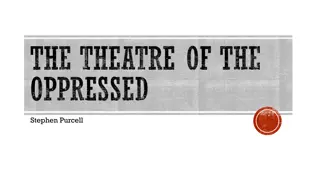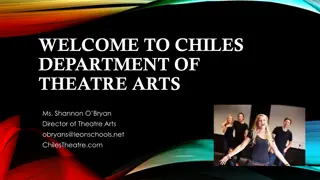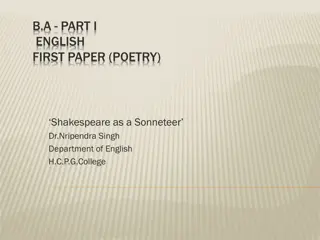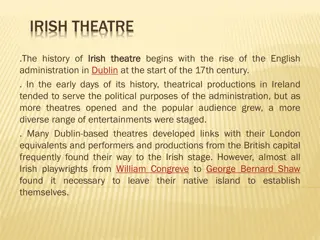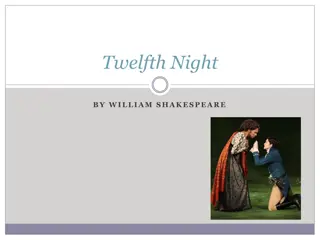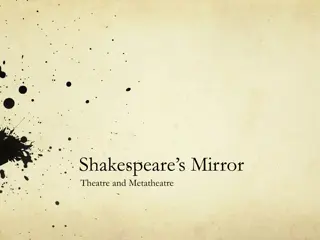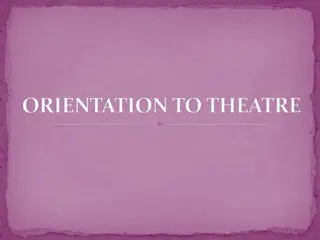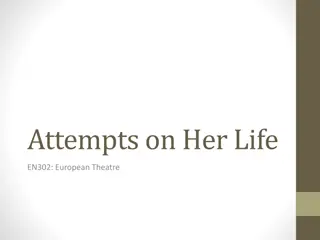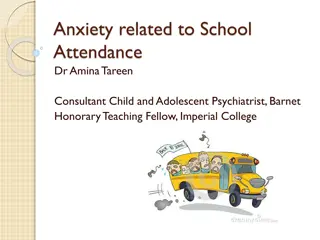Shakespeare and Metatheatre: Exploring Elizabethan Theatre Anxiety
Explore the Elizabethan anxiety surrounding the theatre during Shakespeare's time, as highlighted by Philip Stubbes and Sir Philip Sidney. The text delves into concerns about the immoral influence of plays and interludes, portraying a vivid picture of the societal apprehensions towards theater and its representations.
Download Presentation

Please find below an Image/Link to download the presentation.
The content on the website is provided AS IS for your information and personal use only. It may not be sold, licensed, or shared on other websites without obtaining consent from the author. Download presentation by click this link. If you encounter any issues during the download, it is possible that the publisher has removed the file from their server.
E N D
Presentation Transcript
Shakespeare and Metatheatre
Elizabethan anxiety about the theatre New buildings: The Theatre (1576); The Curtain (1577) Philip Stubbes, The Anatomie of Abuses, 1583: but mark the flocking and running to Theatres and Curtains, daily and hourly, night and day, time and tide, to see plays and interludes, where such wanton gestures, such bawdy speeches, such laughing and fleering, such kissing and bussing, such clipping and culling, such winking and glancing of wanton eyes, and the like is used, as is wonderful to behold. Then these goodly pageants being done, every mate sorts to his mate, every one brings another homeward of their way very friendly, and in their secret conclaves (covertly) they play the sodomites, or worse. And these be the fruits of plays and interludes, for the most part. And whereas, you say, there are good examples to be learned in them: truly so there are
Elizabethan anxiety about the theatre if you will learn falsehood; if you will learn cozenage; if you will learn to deceive; if you will learn to play the hypocrite, to cog, to lie and falsify; if you will learn to jest, laugh and fleer, to grin, to nod and mow; if you will learn to play the Vice, to swear, tear and blaspheme both heaven and earth; if you will learn to become a bawd, unclean, and to devirginate maids, to deflower honest wives; if you will learn to murder, flay, kill, pick, steal, rob and rove, if you will learn to rebel against princes, to commit treasons, to consume treasures, to practise idleness, to sing and talk of bawdy love and venery; if you will learn to deride, scoff, mock and flout, to flatter and smooth; if you will learn to play the whoremaster, the glutton, drunkard, or incestuous person; if you will learn to become proud, haughty and arrogant; and finally, if you will learn to contemn God and all His laws, to care neither for Heaven nor Hell, and to commit all kind of sin and mischief, you need to go to no other school, for all these good examples may you see painted before your eyes in interludes and plays.
Elizabethan anxiety about the theatre Sir Philip Sidney, An Apology for Poetry, c.1579 (published 1595): To the arguments of abuse, I will after answer, only thus much now is to be said, that the Comedy is an imitation of the common errors of our life, which he representeth in the most ridiculous & scornful sort that may be: so as it is impossible that any beholder can be content to be such a one. [ ] So that the right use of Comedy, will I think, by nobody be blamed; and much less of the high and excellent Tragedy, that openeth the greatest wounds, and sheweth forth the ulcers that are covered with Tissue, that maketh Kings fear to be Tyrants, and Tyrants manifest their tyrannical humours, that with stirring the affects of Admiration and Commiseration, teacheth the uncertainty of this world, and upon how weak foundations gilden roofs are builded.
Elizabethan anxiety about the theatre Thomas Heywood, An Apology for Actors, 1612 (some of this is paraphrasing Sidney): Plays are writ with this aim, and carried with this method, to teach the subjects obedience to their King, to shew the people the untimely ends of such as have moved tumults, commotions, and insurrections [ ] If we present a Tragedy, we include the fatal and abortive ends of such as commit notorious murders, which is aggravated and acted with all the Art that may be, to terrify men from the like abhorred practises. [...] If a Comedy, it is pleasantly contrived with merry accidents [ ] to shew others their slovenly and unhandsome behaviour, that they may reform that simplicity in themselves [ ] or to refresh such weary spirits as are tired with labour, or study, to moderate the cares and heaviness of the mind, that they may return to their trades and faculties with more zeal and earnestness, after some small soft and pleasant retirement.
The effects of drama upon its audience Heywood s view of the effects of drama tallies with Hamlet s: HAMLET. I have heard that guilty creatures sitting at a play Have by the very cunning of the scene Been struck so to the soul that presently They have proclaimed their malefactions (2.2.591-4) Certainly Claudius s abrupt exit from The Murder of Gonzago suggests that the play has caught his conscience .
The effects of drama upon its audience Hamlet has clear ideas about theatre s potential: Suit the action to the word, the word to the action, with this special observance: that you o erstep not the modesty of nature. For anything so overdone is from the purpose of playing, whose end, both at the first and now, was and is to hold as twere the mirror up to nature, to show virtue her own feature, scorn her own image, and the very age and body of the time his form and pressure. (3.2.17-24) David Bevington on this: The play Hamlet, among its other amazing accomplishments, is an astute critical defence of theatre at its highest potential. Hamlet as a play is serious about reform of the English stage. (2009: 142)
The effects of drama in Dream Why are these utterances comical?: BOTTOM. Write me a prologue; and let the prologue seem to say, we will do no harm with our swords, and that Pyramus is not killed indeed; and, for the more better assurance, tell them that I, Pyramus, am not Pyramus, but Bottom the weaver: this will put them out of fear. (3.1.16-20) SNUG. You, ladies, you whose gentle hearts do fear The smallest monstrous mouse that creeps on floor, May now perchance both quake and tremble here When lion rough in wildest rage doth roar. Then know that I one Snug the joiner am A lion fell, nor else no lion s dam. (5.1.217-22) Anne Righter on the playlet in Dream: The interlude becomes, in effect, an essay on the art of destroying a play (1967: 97). Irony of conversation about staging moonlight (3.1.43-56).
Anxiety about theatre in Dream Puck s epilogue: a genuine anxiety about offence? Plato s Republic (c. 380 BC): he [the poet] wakens and encourages and strengthens the lower elements in the mind to the detriment of reason, which is like giving power and control to the worst elements in a state and ruining the better elements . Theseus on the simultaneous romance and danger of fantasy: The lunatic, the lover, and the poet Are of imagination all compact. One sees more devils than vast hell can hold: That is, the madman. The lover, all as frantic, Sees Helen s beauty in a brow of Egypt. The poet s eye, in a fine frenzy rolling, Doth glance from heaven to earth, from earth to heaven, And as imagination bodies forth The forms of things unknown, the poet s pen Turns them to shapes, and gives to airy nothing A local habitation and a name. (5.1.7-17)
Fantasy and shadows John Lyly, Court Prologue to Campaspe, 1583: Whatsoever we present we wish it may be thought the dancing of Agrippa his shadows, who in the moment they were seen were of any shape one could conceive. Shadows in Dream: Oberon as king of shadows (3.2.348) Fiction as shadows: The best in this kind are but shadows, and the worst are no worse if imagination amend them. (5.1.210- 11) Players as shadows: If we shadows have offended (Epilogue 1)
Theatre as conjuring Puck is a self-described actor (3.1.74) and shape-shifter (2.1.44-57 and 3.1.103-6). Titania accuses Oberon of similar deception (2.1.64-8). Love potion tricks the senses: does the enchantment and disenchantment of Titania and Lysander mimic the theatrical effect of the play? What about Demetrius? ( I have found Demetrius like a jewel, / Mine own, and not mine own. 4.1.190-1)
Onstage spectators Shakespeare s onstage spectators are far from idealised they are disruptive in Hamlet, Dream and Love s Labour s Lost. Hamlet makes it clear that he considers his own taste in theatre more refined than that of the masses: for the play, I remember, pleased not the million. Twas caviare to the general. But it was as I received it, and others whose judgments in such matters cried in the top of mine an excellent play, well digested in the scenes, set down with as much modesty as cunning. (2.2.438-43) Polonius is a philistine: This is too long (2.2.501)
Sly as onstage spectator Why do the players in The Taming of the Shrew s Induction perform for Sly? The real reason is not the one they tell him: MESSENGER. Your honour s players, hearing your amendment, Are come to play a pleasant comedy, For so your doctors hold it very meet, Seeing too much sadness hath congealed your blood, And melancholy is the nurse of frenzy. Therefore they thought it good you hear a play And frame your mind to mirth and merriment, Which bars a thousand harms and lengthens life. SLY. Marry, I will let them play it. Is not a comonty A Christmas gambol, or a tumbling trick? BARTHOLOMEW. No, my good lord, it is more pleasing stuff. SLY. What, household stuff? BARTHOLOMEW. It is a kind of history. (Induction 2.125-36)
Sly as onstage spectator Sly in onstage, presumably, through much of the play. His final lines in Shakespeare s play are after 1.1: SLY. Tis a very excellent piece of work, madam lady. Would twere done. (1.1.251) But Sly features more heavily in the anonymous 1594 play The Taming of A Shrew a text whose exact relation to Shakespeare s is the subject of much debate, but which may be either a source for The Shrew, an early draft of it, a memorial reconstruction, or an adaptation of a shared but now-lost original source.
Sly as onstage spectator Like Shakespeare s play, A Shrew opens with the gulling of Christopher Sly, but unlike Shakespeare s, the framing narrative resurfaces throughout the play and is concluded at the end: TAPSTER. Ay, marry, but you had best get you home, For your wife will course you for dreaming here tonight. SLY. Will she? I know now how to tame a shrew. I dreamt upon it all this night till now, And thou hast waked me out of the best dream That ever I had in my life. But I ll to my Wife presently and tame her too, An if she anger me. (15.8-21)
The effects of metadrama? LUCENTIO. But stay a while, what company is this? TRANIO. Master, some show to welcome us to town. (1.1.46-7) PETRUCHIO. He that knows better how to tame a shrew, Now let him speak. Tis charity to show. (4.1.196-7) Graham Holderness argues that the framing narrative could have been performed in the self-reflexive, metadramatic and ironic manner of Brecht s epic theatre (1989: 25).
The effects of metadrama? If this were indeed the case, continues Holderness, then Katherine s final speech might well have been delivered on the Elizabethan stage with appropriate detachment, distancing and irony to an audience highly sceptical of such propagandist rhetoric; offered as a challenge and provocation to debate rather than as an attempt at ideological incorporation. (1989: 25) Elizabeth Schafer suggests, though, that the Sly episode can have the advantage of granting modern audiences permission to laugh at Katherina s taming, because it is seen to be the sort of story that only drunken Elizabethan tinkers enjoyed or believed in (2002: 52).
Shakespeare breaks the fourth wall No, he doesn t! Sidney again: Now for the Poet, he nothing affirmeth, and therefore never lieth What childe is there, that comming to a play, and seeing Thebes written in great letters upon an old doore, doth beleeve that it is Thebes? Or as the author of the second folio s commendatory poem On Worthy Master Shakespeare and his Poems (1632) put it: abused, and glad To be abused, affected with that truth Which we perceive is false; This, and much more which cannot be expressed But by himself, his tongue and his own breast, Was Shakespeare s freehold. (ll. 23-42)
Shakespeare breaks the fourth wall In the words of Julia Briggs: the performance requires the audience to believe and disbelieve simultaneously, yielding themselves up to it self-forgetfully, while letting the play work upon them, involve them, possibly even change them. It requires an immediate and unthinking response, yet pausing to consider the nature of the theatrical illusion makes its paradoxes of appearance and reality difficult to define. (1997: 253-4)
Metatheatrical self-awareness Shakespeare frequently draws the audience s attention to the material realities of the playhouse and its actors, often at moments of heightened emotion: HAMLET. this brave o erhanging [firmament], this majestical roof fretted with golden fire appears no other thing to me than a foul and pestilent congregation of vapours. (2.2.302-5) HAMLET. Remember thee? Ay, thou poor ghost, while memory holds a seat In this distracted globe. (1.5.95-7)
Metatheatrical self-awareness HAMLET. My lord, you played once i th university, you say. POLONIUS. That I did, my lord, and was accounted a good actor. HAMLET. And what did you enact? POLONIUS. I did enact Julius Caesar. I was killed i th Capitol. Brutus killed me. HAMLET. It was a brute part of him to kill so capital a calf there. (3.2.94-101) Hamlet was played by Richard Burbage, who has played Brutus in Julius Caesar; Polonius/Caesar was probably John Heminges (Gurr 1996: 106). Gurr on this in-joke: It reflects in the writers the expectation that their audiences would be well aware of their environs, and that the fictions were to be seen as open mimicry whose pretence at deceit was obvious. (1996: 106)
Metatheatrical self-awareness In a similar manner, argues Righter, Puck s remark to Oberon [see below] forestalls possible objections to the artificiality of the scene which follows (1967: 136): PUCK. Shall we their fond pageant see? Lord, what fools these mortals be! (3.2.114-15) QUINCE. here s a marvellous convenient place for our rehearsal. This green plot shall be our stage, this hawthorn- brake our tiring-house (3.1.2-4) FABIAN. If this were played upon a stage, now, I could condemn it as an improbable fiction. (Twelfth Night, 3.4.125-6)
The life-as-theatre metaphor The term metatheatre was coined by Lionel Abel in his book of the same name (1963). In the 2003 reissue Tragedy and Metatheatre, he writes: The plays I point to as metatheatre have one common character: all of them are theatre pieces about life seen as already theatricalized. (2003: vi) JAQUES. All the world s a stage, And all the men and women merely players. (As You Like It, 2.7.139-40)
The life-as-theatre metaphor HAMLET. Seems, madam? Nay, it is. I know not seems . Tis not alone my inky cloak, good mother, Nor customary suits of solemn black, Nor windy suspiration of forced breath, No, nor the fruitful river in the eye, Nor the dejected havior of the visage, Together with all forms, moods, shapes of grief That can denote me truly. These indeed seem , For they are actions that a man might play: But I have that within which passeth show These but the trappings and the suits of woe. (1.2.76-86)
The life-as-theatre metaphor Life itself is a performance for numerous Shakespearean characters: VIOLA. I am not that I play. (Twelfth Night, 1.5.177) IAGO. I am not what I am. (Othello, 1.1.65) EDMUND. and on s cue out he comes, like the catastrophe of the old comedy; mine is villainous melancholy, with a sigh like them of Bedlam. (King Lear, 1.2.129-31) CORIOLANUS. Why did you wish me milder? would you have me False to my nature? Rather say I play The man I am. (3.2.13-15) CORIOLANUS. Like a dull actor now, I have forgot my part, and I am out, Even to a full disgrace. (5.3.40-2)
Some things a person can play in Shakespeare: the villain (Iago on himself in Othello, 2.3.337) the devil (the Bastard on himself in King John, 2.1.137; Gloucester on himself in Richard III, 1.3.343) the tyrant (Cressida on Troilus, 3.2.114) the cook (Titus on himself in Titus Andronicus, 5.2.205; Belarius and his sons in Cymbeline, 3.6.31 and 4.2.209) the orator (Edward on himself and Gloucester on himself in 3 Henry VI, 1.2.2 and 3.2.204; Buckingham on himself in Richard III, 3.5.95) the humble host (Macbeth on himself in Macbeth, 3.4.5) the pious innocent (Dionyza on Cleon in Pericles, 4.3.18)
Some things a person can play in Shakespeare (continued): the penitent (Antony on himself in Antony and Cleopatra, 2.2.115) the fool (Hal on himself in 2 Henry IV, 2.2.133; Gratiano on himself in The Merchant of Venice, 1.1.82; Hamlet on Polonius in Hamlet, 3.1.143-4; Viola on Feste in Twelfth Night, 3.1.57) the woman (Macduff on himself in Macbeth, 4.3.270; Wolsey on himself in Henry VIII, 3.2.504) the housewife (Capulet on himself in Romeo and Juliet, 4.2.44) the knave (Rosalind on herself in As You Like It, 3.2.285) the swaggerer (Rosalind on herself in As You Like It, 4.3.14) the swan (Emilia on herself, dying, in Othello, 5.2.288)
Gender as performance LORD. Sirrah, go you to Barthol mew, my page, And see him dressed in all suits like a lady. [ ] I know the boy will well usurp the grace, Voice, gait, and action of a gentlewoman. (Induction 1.103-4, 129-30) Transvestism was a central preoccupation for anti- theatricalists; all female characters were, of course, played by male actors. Cross-dressing heroines appear in The Two Gentlemen of Verona, As You Like It, The Merchant of Venice (three times), Twelfth Night and Cymbeline. Rosalind in As You Like It especially draws attention to the codes of behaviour adopted by the different genders.
Power as performance Stephen Gosson, Plays Confuted in Five Actions, 1582: We are commanded by God to abide in the same calling wherein we were called, which is our ordinary vocation in a commonweal. So in a commonweal, if private men be suffered to forsake their calling because they desire to walk gentleman-like in satin and velvet, with a buckler at their heels, proportion is so broken, unity dissolved, harmony confounded, that the whole body must be dismembered and the prince or the head cannot choose but sicken Is Gosson exposing the theatricality of everyday life here?
Power as performance Stephen Greenblatt: Theatricality, in the sense of both disguise and histrionic self- representation, arose from conditions common to almost all Renaissance courts: a group of men and women alienated from the customary roles and revolving uneasily around a centre of power, a constant struggle for recognition and attention, and a virtually fetishistic emphasis upon manner. The manuals of court behaviour which became popular in the sixteenth century are essentially handbooks for actors, practical guides for a society whose members were nearly always on stage. (2005: 162) Sir Thomas More on Richard III s rise to power, History of King Richard III, c. 1515: And so they said that these matters be kings games, as it were, stage plays, and for the more part played upon scaffolds, in which poor men be but the lookers-on.
Statecraft as stagecraft in Hamlet HAMLET. one may smile and smile and be a villain. At least I m sure it may be so in Denmark. (1.5.109-10) HAMLET. my uncle is King of Denmark, and those that would make mouths at him while my father lived give twenty, forty, an hundred ducats apiece for his picture in little. (2.2.364-7) HAMLET. They had begun the play (on Rosencrantz and Guildenstern s deaths, 5.2.32)
Statecraft as stagecraft in Hamlet CLAUDIUS. this vile deed We must, with all our majesty and skill Both countenance and excuse. (4.1.29-31) CLAUDIUS. How dangerous is it that this man goes loose! Yet must not we put the strong law on him. He s loved of the distracted multitude, Who like not in their judgment but their eyes. (4.3.2-5)
Statecraft as stagecraft in 1 Henry IV FALSTAFF. Shall we have a play extempore? (2.5.282-3) PRINCE HARRY. Do thou stand for my father, and examine me upon the particulars of my life. FALSTAFF. Shall I? Content. This chair shall be my state, this dagger my sceptre, and this cushion my crown. PRINCE HARRY. Thy state is taken for a joined-stool, thy golden sceptre for a leaden dagger, and thy precious rich crown for a pitiful bald crown. (2.5.379-85) Falstaff mocks the discourse of stage royalty, improvising in iambic pentameter (2.5.395-401).
Statecraft as stagecraft in 1 Henry IV But Harry is playing a double or even triple role in this scene: FALSTAFF No, my good lord, banish Peto, banish Bardolph, banish Poins, but for sweet Jack Falstaff, kind Jack Falstaff, true Jack Falstaff, valiant Jack Falstaff, and therefore more valiant being, as he is, old Jack Falstaff, Banish not him thy Harry's company, Banish not him thy Harry's company. Banish plump Jack, and banish all the world. PRINCE HENRY. I do, I will. (2.5.478-86)
Statecraft as stagecraft in 1 Henry IV Harry let us in on the secret at the start of the play: PRINCE HARRY. I know you all, and will awhile uphold The unyoked humour of your idleness. Yet herein will I imitate the sun, Who doth permit the base contagious clouds To smother up his beauty from the world, That, when he please again to be himself, Being wanted, he may be more wondered at By breaking through the foul and ugly mists Of vapours that did seem to strangle him. (1.2. 192-200) Eventually, Harry, like Puck, uses the metaphor of the dream to describe his ludic role: KING HARRY. I have long dreamt of such a kind of man, So surfeit-swelled, so old, and so profane; But being awake, I do despise my dream. (5.4.49-51)
Shakespeare and metatheatre Theatre as deceit subversion moral lesson self-deception complicity conjuring wish-fulfilment oscillation or alienation game metaphor for everyday life metaphor for power
References Abel, Lionel (2003) Tragedy and Metatheatre: Essays on Dramatic Form, New York: Holmes & Meier. Bevington, David M. (2009) This Wide and Universal Theater: Shakespeare in Performance, Then and Now, Chicago: University of Chicago Press. Briggs, Julia (1997) This Stage-Play World: Texts and Contexts, 1580-1625, Oxford: Oxford University Press. Greenblatt, Stephen (2005) Renaissance Self-Fashioning: From More to Shakespeare, Chicago: University of Chicago Press.
References Gurr, Andrew (1996) Playgoing in Shakespeare s London, Second Edition, Cambridge: Cambridge University Press. Holderness, Graham (1989) Shakespeare in Performance: The Taming of the Shrew, Manchester: Manchester University Press. Righter, Anne (1967) Shakespeare and the Idea of the Play, Harmondsworth: Penguin Books. Schafer, Elizabeth (2002) Shakespeare in Production: The Taming of the Shrew, Cambridge: Cambridge University Press.





